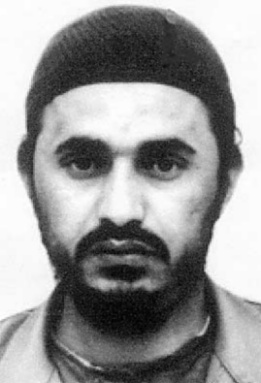
Al-Qaeda is a pan-Islamist militant organization led by Sunni Jihadists who self-identify as a vanguard spearheading a global Islamist revolution to unite the Muslim world under a supra-national Islamic state known as the Caliphate. Its members are mostly composed of Arabs, but also include people from other ethnic groups. Al-Qaeda has mounted attacks on civilian, economic and military targets of America and its allies; such as the 1998 US embassy bombings, the USS Cole bombing and the September 11 attacks. The organization is designated as a terrorist group by NATO, UN Security Council, the European Union, and various countries around the world.

Jama'at al-Tawhid wal-Jihad, abbreviated as JTJ or Jama'at, was a Salafi jihadist militant group. It was founded in Jordan in 1999, and was led by Jordanian national Abu Musab al-Zarqawi for the entirety of its existence. During the Iraqi insurgency (2003–11), the group became a decentralized network with foreign fighters with a considerable Iraqi membership.
Abu Anas al-Shami, was a senior leader in the Jama'at al-Tawhid wal Jihad militant group during the Iraq War. He was a Palestinian from Tulkarm city in the West Bank, born in Kuwait in 1969.
The Saddam–al-Qaeda conspiracy theory was based on false claims made by the United States government, alleging that a highly secretive relationship existed between Iraqi president Saddam Hussein and the Sunni pan-Islamist militant organization al-Qaeda between 1992 and 2003. The George W. Bush administration promoted it as a main rationale for invading Iraq in 2003.
Abu Musab al-Suri, born Mustafa bin Abd al-Qadir Setmariam Nasar, is a suspected Al-Qaeda member and writer best known for his 1,600-page book The Global Islamic Resistance Call. He has held Spanish citizenship since the late 1980s following marriage to a Spanish woman. He is wanted in Spain for the 1985 El Descanso bombing, which killed eighteen people in a restaurant in Madrid, and in connection with the 2004 Madrid train bombings. He is considered by many as 'the most articulate exponent of the modern jihad and its most sophisticated strategist'.
Abu Muhammad al-Maqdisi, or more fully Abu Muhammad Essam al-Maqdisi, is the assumed name of Essam Muhammad Tahir al-Barqawi, an Islamist Jordanian-Palestinian writer. A Salafi jihadi ideologue, he has popularized many of the most common themes of radical Islam today, like the theological impetus given to the notion of Al Wala' Wal Bara', being the first to declare the Saudi royal family to be apostates or considering democracy a religion, and thus whoever believes in it to be an apostate, but he is best known as the spiritual mentor of Jordanian jihadist Abu Musab al-Zarqawi, the initial leader of al-Qaeda in Iraq. However, an ideological and methodical split emerged between Maqdisi and Zarqawi in 2004 due to Zarqawi's takfeer proclamations towards all the Shia populations in Iraq. Maqdisi opted for a more cautious approach towards targeted Shia killings, attempting to stop Zarqawi's radical ideological movement before Zarqawi's methods become counter-productive.
The Khalden training camp was one of the oldest and best-known military training camps in Afghanistan. It was located in the mountains of eastern Paktia Province, near to Tora Bora.
Management of Savagery: The Most Critical Stage Through Which the Islamic Nation Will Pass, also translated as Administration of Savagery, is a book by the Islamist strategist Abu Bakr Naji, published on the Internet in 2004. It aimed to provide a strategy for al-Qaeda and other extremists whereby they could create a new Islamic caliphate.

Abu Musab al-Zarqawi, born Ahmad Fadeel al-Nazal al-Khalayleh, was a Jordanian jihadist who ran a terrorist training camp in Afghanistan. He became known after going to Iraq and being responsible for a series of bombings, beheadings, and attacks during the Iraq War, reportedly "turning an insurgency against US troops" in Iraq "into a Shia–Sunni civil war". He was sometimes known by his supporters as the "Sheikh of the slaughterers".

The Salafist Group for Preaching and Combat, known by the French acronym GSPC, was an Algerian islamist terrorist faction in the Algerian Civil War founded in 1998 by Hassan Hattab, a former regional commander of the Armed Islamic Group (GIA). After Hattab was ousted from the organization in 2003, the group officially pledged support for al-Qaeda, and in January 2007, the group officially changed its name to the "Al-Qaeda Organization in the Islamic Maghreb" (AQIM).

Al-Qaeda in Iraq or al-Qaeda in Mesopotamia, officially known as Tanzim Qaidat al-Jihad fi Bilad al-Rafidayn or TQJBR, was a Sunni jihadist organization affiliated with al-Qaeda, during the period from 17th of October 2004 to 15th of October 2006.

Yoram Schweitzer is an Israeli intelligence official who is a senior research fellow at Israel's Institute for National Security Studies (INSS) and is director of the institute's Research Program: Terrorism and Low-Intensity Conflict.

An Afghan jihadist camp, or an Afghan training camp, is a term used to describe a camp or facility used for militant training located in Afghanistan, especially those where members of al-Qaeda trained. At the time of the September 11 attacks in 2001, Indian intelligence officials estimated that there were over 120 jihadist camps operating in Afghanistan and Pakistan, run by a variety of militant groups as well as the intelligence service of Pakistan.

It is believed that members of Al-Qaeda are hiding along the border of Afghanistan and northwest sections of Pakistan. In Iraq, elements loosely associated with al-Qaeda, in the Jama'at al-Tawhid wal-Jihad organization commanded by Abu Musab al-Zarqawi, have played a key role in the War in Iraq.
Ahmad Salama Mabruk, known as Abu Faraj al-Masri, was a senior leader in the Syrian militant group Jabhat Fateh al-Sham and was previously a leader in Jabhat al-Nusra and the Egyptian Islamic Jihad militant groups. He was present alongside Abu Muhammad al-Julani at the announcement of the creation of Jabhat Fateh al-Sham. He was one of 14 people subjected to extraordinary rendition by the CIA before the 2001 declaration of a War on Terror.

Jund Ansar Allah was an armed Islamist organization operating in the Gaza Strip. It was founded in November 2008. On 14 August 2009, the group's spiritual leader, Sheikh Abdel Latif Moussa, announced the establishment of the al-Qaeda inspired Islamic Emirate of Rafah in the Palestinian territories and criticized the ruling power, Hamas, for failing to enforce Sharia law. In response, Hamas attacked the organization, resulting in 24 people killed in the fighting, including six Hamas police officers and a further 150 were wounded. After the battle, Jund Ansar Allah ceased to exist.

Inspire is an English-language online magazine published by the organization al-Qaeda in the Arabian Peninsula (AQAP). The magazine is one of the many ways AQAP uses the Internet to reach its audience. Numerous international and domestic extremists motivated by radical interpretations of Islam have been influenced by the magazine and, in some cases, used its bomb-making instructions in their attempts to carry out attacks. The magazine is an important brand-building tool, not just of AQAP, but of all al-Qaeda branches, franchises and affiliates.

Jahafil Al-Tawhid Wal-Jihad fi Filastin is a Sunni Islamist Palestinian group in the Gaza Strip and the Sinai peninsula, and is the branch of al-Qaeda in Gaza. The establishment of the group was publicly announced on 6 November 2008, with communiqués vowing loyalty to al-Qaeda, after having "received the messages of Osama bin Laden and Ayman Al-Zawahiri." Various forms of the "Tawhid al-Jihad" label have appeared in relation to developments in the Gaza Strip. The size of the group is not publicly known.
Sami Mahmud Mohammed al-Oraydi or Abu Mahmoud al-Shami is a senior sharia official for the al-Qaeda affiliated Hurras al-Din who was the chief religious authority for al-Nusra Front and the group's former second-in-command.
The 2010 Norway terror plot was a Norway-based plan to bomb the Danish newspaper Jyllands-Posten and to kill the cartoonist Kurt Westergaard. Two men with links to Al-Qaeda were convicted of the plot, while a third person was acquitted of terror charges.





